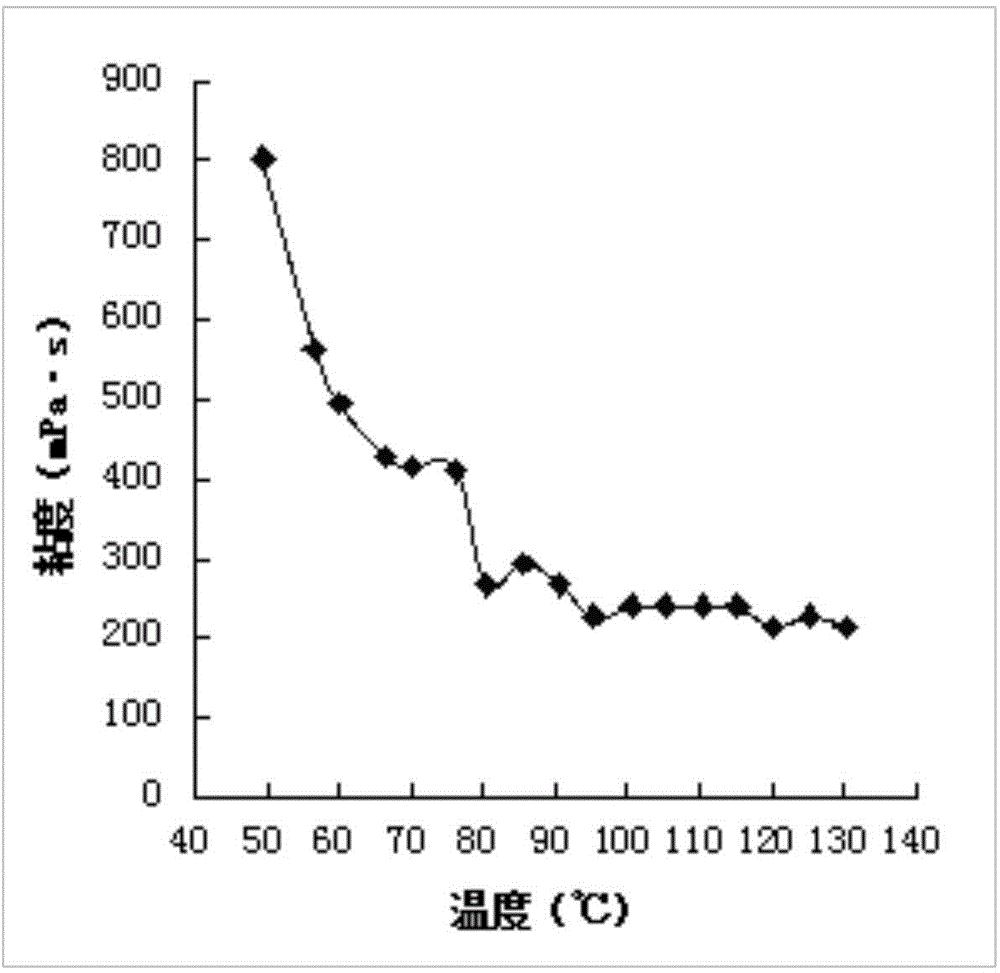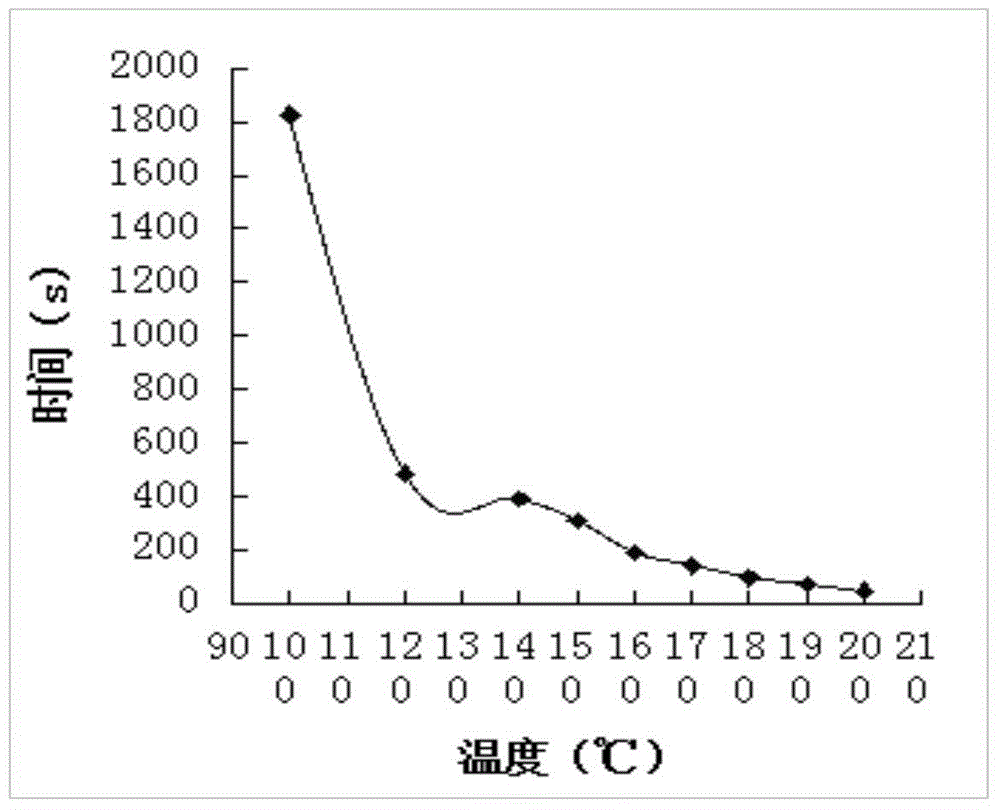High-temperature-resistant, phosphorus-bromine-type and solvent-free epoxy adhesive and preparation method thereof
An epoxy adhesive, phosphorus bromine type technology, applied in the direction of adhesives, epoxy resin adhesives, adhesive types, etc., can solve the problems of high price, unfavorable large-scale popularization and application, high cost of polyetherimide resin, and achieve Easy to operate, good application prospect, environment-friendly effect
- Summary
- Abstract
- Description
- Claims
- Application Information
AI Technical Summary
Problems solved by technology
Method used
Image
Examples
Embodiment 1
[0047] Put 100.0 grams of ES216 epoxy resin, 4.0 grams of 9,10-dihydro-9-oxa-10-phosphaphenanthrene-10-oxide (DOPO) and 10.0 grams of tetrabromophthalic anhydride (TBPA) into the reactor, After reacting at 110°C for 1.5 hours, add 15.0 grams of hydrogenated bisphenol A epoxy resin, stir and mix evenly to obtain 129.0 grams of component A, which is designated as A1.
[0048] 2.0 g of 4,4'-bismaleimidodiphenylmethane and 16.0 g of 2,2-bis[4-(4-maleimidophenoxy)phenyl]propane and 32.0 g of organic Put the silicone resin (YASI) into the reaction kettle, react at 130°C for 30 minutes, add 35.0 grams of CE793, stir and mix evenly to obtain 85.0 grams of component B, which is designated as B1.
[0049] Put 129.0 grams of A1 component, 85.0 grams of B1 component, 200.0 grams of dodecenyl succinic anhydride, 60.0 grams of methyl tetrahydrophthalic anhydride, and 5.0 grams of 2,4,6-tris(dimethylaminomethyl)phenol into In the reaction kettle, stir and mix evenly to obtain 479.0 grams of...
Embodiment 2
[0051] Put 100.0 grams of ES216 epoxy resin, 30.0 grams of 9,10-dihydro-9-oxa-10-phosphaphenanthrene-10-oxide (DOPO) and 35.0 grams of tetrabromophthalic anhydride (TBPA) into the reactor, After reacting at 130°C for 0.5 hours, add 25.0 grams of hydrogenated bisphenol A epoxy resin and 45.0 grams of CE793, stir and mix evenly to obtain 235.0 grams of component A, which is designated as A2.
[0052] Put 2.0 grams of 4,4'-bismaleimidodiphenylmethane and 10.0 grams of silicone resin (YASI) into the reaction kettle, and after reacting at 110°C for 60 minutes, add 10.0 grams of hydrogenated bisphenol A epoxy resin and 20.0 grams of CE793, stirred and mixed evenly to obtain 42.0 grams of component B, denoted as B2.
[0053] Put 235.0 grams of A2 component, 42.0 grams of B2 component, 80.0 grams of methyltetrahydrophthalic anhydride, 3.0 grams of aluminum acetylacetonate and 15.0 grams of 1,8-diazabicyclo[5.4.0]undecene-7 into the reaction In the kettle, stir and mix evenly to obtai...
Embodiment 3
[0055] Take an appropriate amount of the high-temperature-resistant phosphorus-bromine type solvent-free epoxy adhesives of Example 1 and Example 2, namely HTPM-1 and HTPM-2, and apply them evenly on standard stainless steel test pieces respectively. After airing at room temperature for 10 minutes, stack Combined, clamped, put into a blast oven for curing: start from room temperature to 70°C, keep warm for 2 hours, continue to heat up to 120°C, keep warm for 1 hour, continue to heat up to 170°C, keep warm for 1.5 hours, naturally Cool to room temperature. The tensile shear strength (σ) test was carried out at room temperature (25°C) and high temperature (220°C) using an electronic tensile machine, and the results are shown in Table 1.
[0056] Take appropriate amount of high temperature resistant phosphorus bromine type solvent-free epoxy adhesive of embodiment 1 and embodiment 2 respectively, i.e. HTPM-1, HTPM-2, push the film on the polytetrafluoroethylene film, place it in ...
PUM
 Login to View More
Login to View More Abstract
Description
Claims
Application Information
 Login to View More
Login to View More - R&D
- Intellectual Property
- Life Sciences
- Materials
- Tech Scout
- Unparalleled Data Quality
- Higher Quality Content
- 60% Fewer Hallucinations
Browse by: Latest US Patents, China's latest patents, Technical Efficacy Thesaurus, Application Domain, Technology Topic, Popular Technical Reports.
© 2025 PatSnap. All rights reserved.Legal|Privacy policy|Modern Slavery Act Transparency Statement|Sitemap|About US| Contact US: help@patsnap.com



